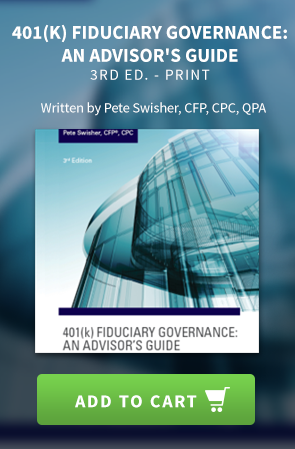Fiduciary Rules and Practices
Addressing the 2020 NAPA D.C. Fly-In Forum July 21, a key Department of Labor (DOL) official confirmed that the DOL’s deadline relief provided in response to the Coronavirus pandemic also applies to initial paper notices under the DOL’s new electronic disclosure regulations.
Responding to a...
READ MORE
NTSA is always providing information and insights that will be valuable to its members! Following is information about NTSA webcasts.
Upcoming Webcast
NTSA Webcast: Pandemic Pandemonium—Navigating the new COVID-19 Retirement Plan Rules
Thursday, July 30, 2020
2:00 – 2:50 p.m. ET
...
READ MORE
On May 21, the Department of Labor (DOL) finalized a new safe harbor for electronic disclosures. A July 9 Plan Sponsor Council of America (PSCA) webcast discussed the new safe harbor, the scope of the rules and what it all means.
Panelists in “The New Electronic Disclosure Rule Is Here!” included...
READ MORE
Hiring a co-fiduciary doesn’t keep you from being an ERISA fiduciary.
All fiduciaries have potential liability for the actions of their co-fiduciaries. If a fiduciary knowingly participates in another fiduciary’s breach of responsibility, conceals that breach, or does not take steps to correct...
READ MORE
A group of Senate Democrats is calling on the Labor Department to withdraw its proposal clarifying the investment duties of ERISA plan fiduciaries in relation to environmental, social and governance (ESG) criteria, saying the proposal would discourage financial advisors from supporting racial...
READ MORE
Noting that the Department of Labor previously held several days of hearings under the former fiduciary rule, the ranking Democrat on the Senate committee with primary jurisdiction over ERISA-related issues has called on the DOL to hold a hearing.
The request comes from Sen. Patty Murray (D-WA...
READ MORE
In MarketBeat, Robert Toth discusses the challenges entailed in providing loans and distributions under the CARES Act, and how fiduciary rules figure in meeting them.
READ MORE
As an ERISA fiduciary, you’re expected to be an expert — or to hire help that is.
ERISA’s “Prudent Man” rule is a standard of care, and when fiduciaries act for the exclusive purpose of providing benefits, they must act at the level of a hypothetical knowledgeable person and must reach informed...
READ MORE
Legislation has been reintroduced to create a national, online “lost and found” database to help plan participants keep track of their retirement accounts as they move from job to job.
The Retirement Savings Lost and Found Act sponsored by Sens. Elizabeth Warren (D-MA) and Steve Daines (R-MT)...
READ MORE
The Department of Labor cautions that “fiduciaries who no longer want to serve in that role cannot simply walk away from their responsibilities, even if the plan has other fiduciaries. They need to follow plan procedures and make sure that another fiduciary is carrying out the responsibilities left...
READ MORE
The NTSA offers an exclusive series of podcasts — the NTSA Elite Advisor WOWcasts — recorded by NTSA Elite Advisors, sharing insights on ways to build, expand and enhance your practice.
NTSA Elite Advisors are the “best of the best” — excelling in advocacy, practice management and leadership....
READ MORE
The Labor Department has finally unveiled its much anticipated fiduciary rule, though it’s a mixed bag and has a certain “back to the future” feel, along with some new implications for recordkeepers, Pooled Employer Plans and rollover advice.
Titled “Improving Investment Advice for Workers...
READ MORE
Noting its concern “that the growing emphasis on ESG investing may be prompting ERISA plan fiduciaries to make investment decisions for purposes distinct from providing benefits to participants and beneficiaries and defraying reasonable expenses of administering the plan,” the Labor Department has...
READ MORE
Some Form 5500 filers received relief in April, but not all. And the July 31 Form 5500 deadline looms for calendar-year plans—pandemic or no pandemic. And that includes 403(b) plans covered by ERISA.
IRS Notice 2020-23 granted extensions to individuals, trusts, estates, corporations, exempt...
READ MORE
In MarketBeat, Ted Godbout discusses a white paper that examines the recent history and trends relating to excessive fee claims, plan features that may make them a target of litigation and steps fiduciaries can take to reduce exposure to excessive fee lawsuits.
READ MORE
The Internal Revenue Service has provided temporary administrative relief to help certain retirement plan participants or beneficiaries who need to make participant elections by allowing flexibility for remote signatures.
Specifically, Notice 2020-42 provides participants, beneficiaries and...
READ MORE
If you were wondering what the Labor Department was planning to do about its reported revision of the fiduciary rule, wonder no more; a proposal has just been submitted to the Office of Management and Budget for review.
The OMB’s Office of Information and Regulatory Affairs, which is part of...
READ MORE
The parties in one of the first university 403(b) plan excessive fee suits[1] filed in 2016 have come to terms.
This time the settlement (Henderson v. Emory Univ., N.D. Ga., No. 1:16-cv-02920, motion for preliminary settlement approval 5/29/20) involves the Emory University Retirement Plan and...
READ MORE
Concluding that “courts sometimes make standing law more complicated than it needs to be,” in a 5-4 decision, the nation’s highest court has ruled that plaintiffs in a suit involving a defined benefit plan hadn’t incurred the loss of benefits necessary to establish the right to bring suit.
More...
READ MORE
In MarketBeat, John Iekel discusses a recent blog entry that argues that cyber breaches of retirement plans put more than participants at risk—they also put plan sponsors at risk of fiduciary liability.
READ MORE


